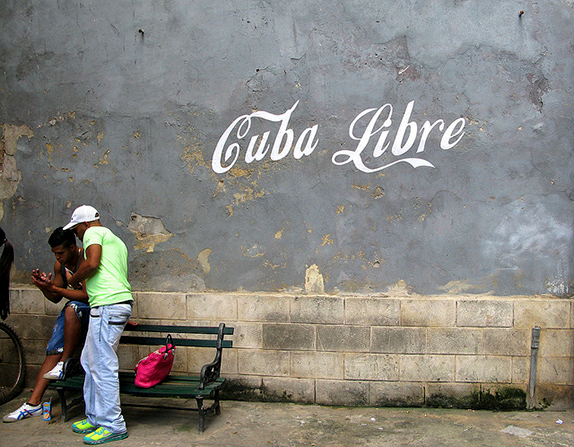
The United States and Cuba are set to re-establish diplomatic relations. Someone pinch me. I didn’t expect this. I long ago concluded that it would never happen in my lifetime. I am elated that I have lived to see this moment.
Now then comes the really hard part, and I have two questions. Will the United States unilaterally end its draconian economic embargo of Cuba, in effect since the early 1960s and roundly condemned throughout the world? Or will it set unnecessary barriers to full normalization by demanding concessions from Cuba that are linked to the lifting of that embargo?
I suspect that we have just been handed front row seats to a new drama, one in which the ongoing battle between the two countries will define what “sovereignty” really means in this era of “free trade” and neoliberalism.
Most in the U.S. view the conflict between our country and Cuba as a 50 year-old anachronism, a relic of the cold war. As the story goes, Cuba went “communist” and the U.S. went crazy in response.
But it’s much deeper than that. In fact, for more than 200 years Cuba and the United States have been joined in a kind of love/hate pas de deux that began long before Cubans even called themselves that. Cuban national identity took shape alongside, and in relationship with, that of the U.S. Likewise Cuban culture was greatly influenced by the U.S., and vice versa. A deep relationship formed, one that still exists today.
But that relationship has always been characterized by conflict, the roots of which go back to 1808, when Thomas Jefferson asked Spain to cede the island to the U.S. and was rebuffed. For the next 50 years, each and every debate in Congress over slavery considered Cuba a potential new slave territory, whose addition could balance the addition of new free states and territories to the growing imperial project. As with the lands to the west, Cuba was routinely considered as the next piece of U.S. real estate, the only barrier to the acquisition being the inconvenience that it was a Spanish colony.
Then, in 1868 the Cuban independence movement took its cue from the Union’s experience in the Civil War and recognized that there could be no freedom from Spain without the abolition of slavery on the island. African descendent Cubans became the backbone of the mambí liberation army.
Cuba achieved its “independence” in 1902, a status in fact granted by the United States, which had swept down at the eleventh hour of the War of Independence to snatch the island away from Spain. This “independence” came with accompanying shackles, including an amendment to the new Cuban constitution that gave the colossus to the north the right to militarily intervene in Cuba anytime it saw fit. And so it did on multiple occasions up until the 1930s when the amendment was finally rescinded. The “independence” was also accompanied by the imposition of “Jim Crow” laws, the forerunners of apartheid just previously perfected in the U.S. and being viciously applied there against Afro-descendants, Mexicans and Asians. Above all, Cuban “independence” came with the price of U.S. economic domination of the island. North American businesses and landowners already controlled the lion’s share of the Cuban economy by the turn of the 20th Century.
Meaningful independence from the United States – and not “socialism” nor relations with the Soviet Union – was the centerpiece of the 1959 Cuban Revolution. Independence for the country to pursue its own foreign policy. Independence to determine the role that basic concepts of social justice would play in the society. Independence to rid itself of the U.S. mafia, which had set itself up quite nicely in Havana and was running the tourism industry. Independence to outlaw “Jim Crow” apartheid. And finally, independence to decide what “democracy” meant for Cubans.
Cuba’s loud declaration of its sovereignty, only 90 miles south of Key West, was more than enough to make U.S. leaders go really crazy. To paraphrase former State Department official Wayne Smith, it caused Washington to react in a manner not unlike that of a werewolf that has just noticed a full moon on the rise.
Cubans have plenty of complaints about present-day realities on the island. Yet no one that I know in Cuba – and this includes many people from all walks of life – has ever told me that they would support the elimination of their rights to free public education, universal healthcare, affordable housing and public transportation, or free childcare. If in fact the U.S. demands, as part of the process of rapprochement, that the desires of “the Cuban people” be fully considered, then we can all rest assured that the State Department and Congress will treat these rights as sacrosanct, just as Cubans do today.
However, such rights are anathema to the “free trade” neoliberal agenda. Moreover, U.S. policy has never been about “the Cuban people.” Rather it has served historically as a vehicle for the preservation and promotion of a self-perceived U.S. right – one now quite deeply ingrained – to tell Cuba what to do, and how and when to do it.
Clearly, there is plenty at stake for the Cuban people as this new chapter of an old history unfolds.
(Photo by Poster Boy / CC)



Responses to “Which Way for Cuban Sovereignty in the Wake of the Obama Opening?”